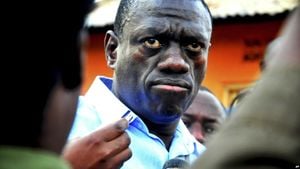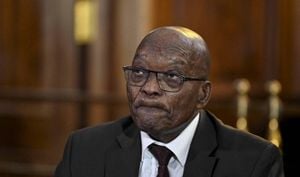Robert F. Kennedy Jr.'s recent political maneuvering has ignited controversy, particularly due to his past statements about Donald Trump. Kennedy, who once critiqued Trump's supporters harshly, has faced backlash after his comments resurfaced online. The audio from his radio show, where he described Trump's base as "belligerent idiots" and likened them to "outright Nazis," has drawn significant attention and criticism.
Initially, Kennedy's words seemed to reflect widespread concerns about Trump's political tactics. Back in 2016, as Trump was gaining traction with his nationalist movement, Kennedy expressed alarm over what he perceived as Trump's exploitation of fear and bigotry. He warned how such tactics could lead to environmental degradation and civil unrest, drawing historical parallels to authoritarian leaders like Adolf Hitler and Mussolini.
During these early criticisms, Kennedy pointed out the way Trump exacerbated racial tensions, particularly through his rhetoric aimed at minority communities. His analysis included remarks on Trump's fear-based campaigning directed at Muslims and Black citizens, illustrating how such divisive rhetoric could undermine social cohesion.
On one notable episode of his radio show, Kennedy engaged with journalist Matt Taibbi, highlighting the dangerous melding of ardent Trump supporters with those who might lack conviction. He quoted Taibbi's analysis of how fragile alliances, built on opportunism and spinelessness, could lend strength to dictatorial tendencies. Kennedy stated, "We may not have many outright Nazis, but plenty of cowards and bootlickers exist, and once they start rallying around Trump, the game's over."
Yet, Kennedy also noted the differences between Trump and Hitler, arguing, "Hitler had like a plan; he was interested in policy. I don't think Trump has any of it." This comment struck many as particularly dismissive of the serious nature of political discourse, especially for someone vying for significant political office.
The fallout from Kennedy's past statements reached new heights when he recently apologized for his comments. He expressed regret over the disdain he once held for Trump, claiming he was unduly influenced by the mainstream media's portrayal of the former president. Kennedy stated, "I allowed myself to believe the mainstream media’s distorted, dystopian portrait of President Trump. I no longer hold this belief and now regret having made those statements."
Kennedy's words raise questions about political integrity and the fluidity of allegiance within party structures. Having once cast Trump as the embodiment of political danger, his recent endorsement of the former president has alarmed many past supporters who feel betrayed by his shift.
Social media platforms quickly became the battleground where both supporters and critics weighed in on Kennedy's transformation. Responses ranged from ridicule to concern, with critics chastising him for his apparent hypocrisy. Some pointedly reminded him of his derogatory labels toward Trump and his base, asking, "Did those descriptions not age well for him?" Others simply echoed the sentiment of disbelief shared among many who had followed his previous campaigns, stating, "It's ridiculous how many people close to Trump have previously compared him to Hitler." This reflected broader public sentiment about the stark contrasts and conflicts within political coalitions.
Kennedy's controversial climb within American politics continues as he secures himself within the Trump camp. With Trump winning the 2024 presidential election, Kennedy's position has raised eyebrows, especially considering his previous remarks. The juxtaposition of Kennedy's past warnings and his current relationship with Trump encapsulates the tumultuous nature of US politics, particularly as loyalty is tested against personal ambitions and public perceptions.
His past positions and present actions intertwine with broader themes of political domination, loyalty, and the malleability of political stances. It’s as if the old line between friend and foe within political circles has faded, leaving observers to wonder about the future of Kennedy's political aspirations.
Now, as Kennedy looks expectedly at his potential role within the Trump administration, questions linger about the consequences of aligning with the very leader he once criticized so vehemently. It’s not just his critics asking: Has he really changed? Or is this merely the next step for someone who’s now turned his eye to the power dynamics he once opposed?
What remains true is the reality of American political discourse—where lines blur, alliances shift, and ideologies can feel as fluid as the campaigns waged on social media. Kennedy's evolution is emblematic of the larger phenomenon where party loyalty and personal ambition often clash, testing the limits of genuine political conviction.



